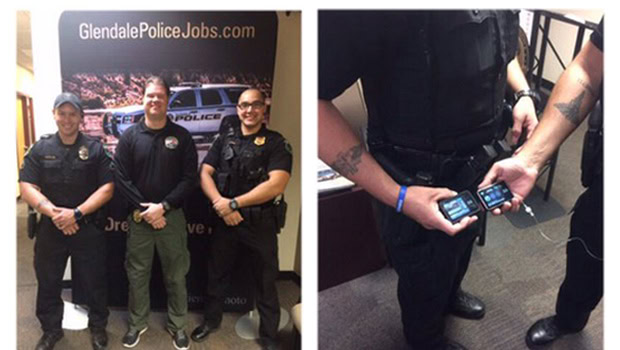The Three Glendale Police Officers with Type 1

Recently, an Arizona police department launched a campaign during Diabetes Awareness Month to let people know it’s hiring twenty officers, and that people with diabetes are welcome to apply.
The Glendale, Arizona police department has been using its Twitter account to initiate a community outreach effort featuring three accomplished officers with Type 1 from the force. In telephone interviews in December and January, we spoke with two uniformed officers, James Calderon and Taylor Carr, and Derek Johnston, a family services detective. Combined, the trio has been serving Glendale for more than 20 years, without any hiccup in their service or their health.
Calderon, a native of suburban New York City, aspired to be a pilot in the Armed Forces, but was turned away after his medical review.
“It was ‘You can’t do this. You’re a Type 1 diabetic,’” he says.
The New York Police Department also declined to consider him for a post. Then a friend who had become a police officer in Virginia encouraged him to apply for a position in Roanoke. After graduating from a regional Virginia police academy and beginning his law enforcement career in that state, he learned of openings in Phoenix and Glendale. Glendale responded first to his applications, and he made the move. He has been a patrol officer for a dozen years, and now serves as an in-service training officer.
Carr, an Arizona native, was given a Type 1 diagnosis at the age of 11. It was quite an adjustment for him and his family.
“I wound up in the hospital for two or three days,” Carr says. “No one in my family had ever had Type 1 or Type 2.”
Carr had dreamed of military service as a child, but found the possibility of entering the armed forces increasingly unlikely. Instead, he entered Northern Arizona University to study psychology. It was there that he was prodded to pursue a career in law enforcement.
“It was an after-class meeting with a professor, who’d been an officer and with the FBI. I’d given up being a police officer, too, because of my diabetes,” Carr says. “Then he said, ‘No, what are you talking about?’ He knew officers and agents with diabetes.”
Carr changed his major to criminal justice, applied to the Yuma Police Department, and went to the Police Academy for recruit training. He started work with another force in the state before joining up with the Glendale force two and a half years ago. The move meant he worked near where he grew up. He’s an alumnus of Camp AZDA, a diabetes camp where he also served as a counselor for five years; he also has been a fundraiser for annual diabetes walks.
“Camp changed my life, so I need to give back,” he says.
Johnston is a Phoenix-area native who was diagnosed with Type 1 at age 14. He studied criminal justice at Glendale Community College and Arizona State University before entering the Arizona Law Enforcement Academy. He has been an officer since 2005, and now works in the Department’s Family Violence Unit. Johnston says his fellow officers have been very supportive as he manages his diabetes and the demands of the job.
“Every supervisor has always said, ‘Do whatever you’ve got to do to keep yourself healthy and safe,’” Johnston says.
Carr echoed Johnston’s observations about the Department’s collegial atmosphere and support.
“Both of my sergeants have always said, ‘Don’t worry about taking a break when you need to,’ even if I’m responding to a call.”
Carr says he has felt lows coming on while on duty, but he’s always kept things in control.
“I have a little bottle of maple syrup from the Cracker Barrel on the seat in case I need it.”
The three report that their personal experience with Type 1 has helped them better navigate diabetes-related issues in their police work. Calderon said he teaches recruits and other offices how to recognize signs of diabetic distress at traffic stops and during emergency calls. He’s also used it to bust an impaired driver who offered a phony diabetes ploy to try to avoid a DUI arrest.
“I asked him what kind of insulin he used,” Calderon says.
The police department’s decision to hire people with diabetes, and to talk up that hiring policy, is a refreshing change. Hopefully, it will nudge other less-inclusive law enforcement department units to follow suit.
Thanks for reading this Insulin Nation article. Want more Type 1 news? Subscribe here.
Have Type 2 diabetes or know someone who does? Try Type2Nation.